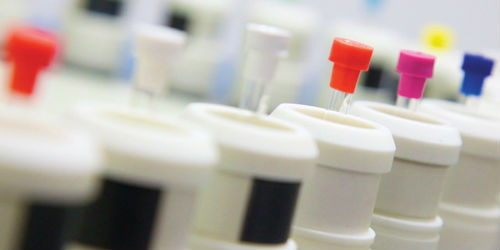Sugar sensing technology
Synthetic carbohydrate- sensing molecules are at the core of an innovative new carbohydrate sensing technology being developed and commercialised by the start-up chemistry company, Ziylo.
Monitoring sugar levels is important for many industries from wine-making to human health. The well-established methods currently used to monitor sugar levels provide measurements for discreet points in time. Ziylo's novel technology will make continuous monitoring of sugar levels possible for the first time, giving industries a tool for more effective management.
The world's first artificial biomimetic sugar receptors
Professor Anthony Davis has spent over 20 years researching carbohydrate-binding proteins, known as lectins. Carbohydrates are essential bio-molecules for all living organisms. It is, therefore, not surprising that lectins play pivotal roles within many biological systems - from modulating the immune system's inflammatory response to regulating cell adhesion.
The Davis Research Group has applied a deep understanding of biological lectins to the design and synthesis of novel molecules that mimic proteins in how they bind carbohydrates in water. These molecules are known as synthetic lectins and are some of the world's first artificial biomimetic sugar receptors.
Synthetic carbohydrate-sensing molecules were originally developed in the School of Chemistry. The research underpinning the technology being developed by Ziylo was funded by the Engineering and Physical Sciences Research Council as well as a studentship from the Bristol Chemical Synthesis Doctoral Training Centre.
Davis and his PhD student at the time, Harry Destecroix, recognised the commercial potential for these receptors as a core component of a sugar-sensing system that could accurately measure carbohydrates continuously.
In 2014, they formed Ziylo, with Destecroix as CEO, to further develop the technology and bring it to market.
Combined expertise to create new technology
The team at Ziylo are now combining their expertise in supramolecular chemistry with photonics and microelectronics to develop a scalable and cost-effective sensor platform that can be adapted for different purposes within a variety of industries.
The synthetic lectins are designed to be sensitive and selective for glucose, but they are also designed to be optically active, changing properties directly in relation to the amount of sugar present. This optical signal can then be monitored remotely to give a continuous measure of glucose levels in real time.
Food, beverage and health applications
This technology has broad applications in the food and beverage industry where sugar levels need to be monitored to track the fermentation of alcoholic beverages, such as beer and wine, as well as in the production of juices and carbonated beverages.
Ziylo's technology also has direct applications for human health. Blood glucose levels are monitored for the management of diabetes, particularly where insulin injections are required. They are also monitored in intensive care units of hospitals as it has been established that blood glucose levels impact the outcomes of ICU patients. Although the platforms for these two applications would be quite different, they would both provide a system of collecting reliable uninterrupted data, throughout the day and night, that could then be used to more effectively manage blood glucose.
A start-up worth investing in
Ziylo has received considerable support, validating the commercial potential of their technology. Since its inception, Ziylo has secured more than £1 million of funding through government grants and private investment.
In 2016, they were awarded £500,000 from InnovateUK as part of the ICURe Innovation-to-Commercialisation programme, which is funded by InnovateUK and the Higher Education Funding Council for England. They also received £142,000 through the Innovation 4 Growth funding scheme put in place by the UK Government to support SMEs in the South West who are developing innovative products, technologies, processes and services.
“2016 was a fantastic year for Ziylo. Our scientific team, the majority of which were educated at University of Bristol, progressed our technology significantly through their hard work and determination. I'm equally grateful for the support given by SETsquared in continuing to help shape our strategy and direction. 2017 will see us move our research base from the University's School of Chemistry to Unit DX.
The support from the University has been crucial over the past 18 months, with special thanks to Professors Nick Norman and Tim Gallagher, but we have now outgrown our space there. I'm looking forward to a new chapter at Unit DX, which will allow us to expand our scientific team, further accelerate our technology and continue to meet our development goals, all while remaining in Bristol.”
Dr Harry Destecroix, Chief Executive Officer and co-founder of Ziylo

